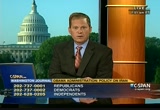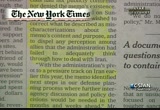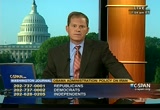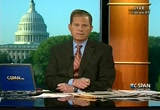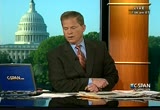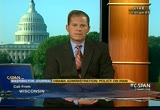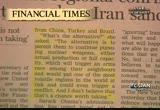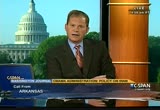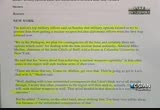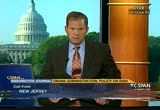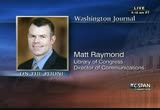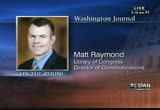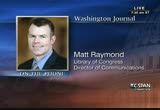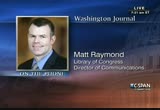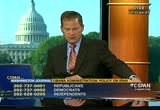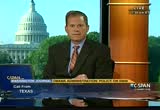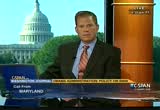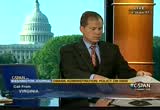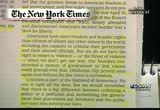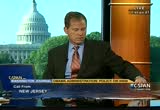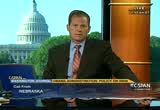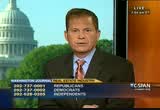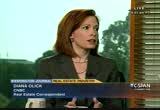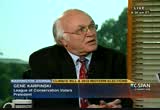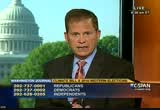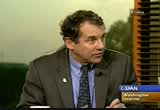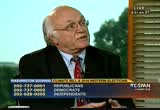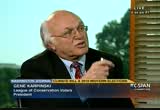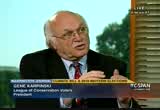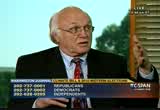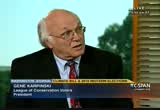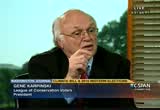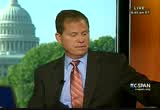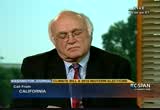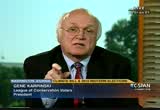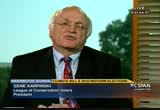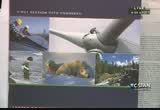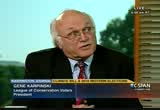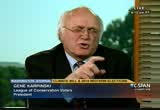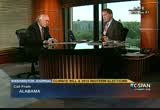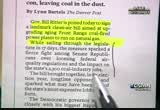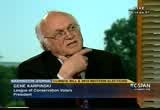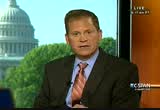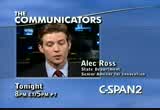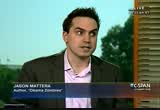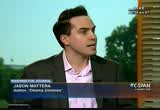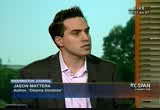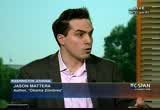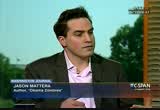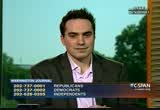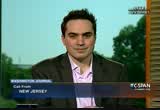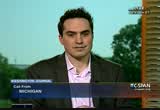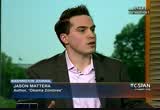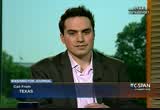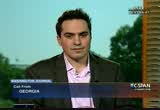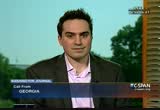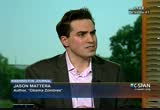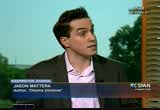tv Washington Journal CSPAN April 19, 2010 7:00am-10:00am EDT
7:00 am
midterm elections. and also the editor in chief of "human events." plus today's news and phone calls and e-mails. "washington journal" is next. [captioning performed by national captioning institute] [captions copyright national cable satellite corp. 2010] host: monday morning, april 19, 2010. president obama later today heads to california for a fund raiser for senator boxer. the senate this week could take of financial regulations legislation. we want to begin asking you about u.s. policy on iran. this in the wake of some news over the weekend that secretary gates sent a letter to the administration with questions about u.s. policy about iran. at the numbers to call --
7:01 am
if you have called in and reached "washington journal" the last 30 days and got on the air, don't call us this morning but you can reach us at twitter and also your e-mail is welcome journal@c-span.org. those of you watching noticing a new look of some of the graphics, due to our transition over the next couple of months to hd television. we will get to your phone calls momentarily starting with financial regulation. a headline and "the wall street journal" about goldman sachs and charges that came down from the sec. this one -- sec investigating other sour deals. we will read more about the story in a moment. the funeral for the president of poland and his wife was yesterday in that country. the headline in "the financial times." president obama was not able to go to the funeral to to the ash
7:02 am
cloud from the icelandic volcano that covered much of europe. europe flights to resume, is the headline and "usa today." 63,000 flights have been canceled so far. to our story on u.s.-iran policy. here is a headline in this morning's "the new york times." diggs pushes back on a report of the memo about the iran policy -- gates pushes back.
7:03 am
7:04 am
first up is atlanta. on our democrat line is eric. hi, there. caller: how are you doing? c-span, hey, america. thank you for taking my call. i just wanted to say that corporate media is not the way to get information. host: what do you say is not the way to get information? caller: corporate media. host: go ahead, eric. caller: i am saying corporate media is not the way to get information to american people. iran is not a threat to the u.s. iran is not a threat to the u.s. all i wanted to say. we have been talked about iran for 10 years now. they are not a threat. we have two big oceans.
7:05 am
host: dead in pennsylvania on our independent's line. -- ed in pennsylvania. caller: before i make the comments i wanted something about the guests on c-span. i wish you would have two guests have opposing views sitting across from one another so one can kind of correct the other one. host: we do from time to time. caller: pataki was making so many misstatements and you as a host cannot correct anything. when someone calls in and tries to make a hit the nail on the head, used with a guest will make a comment or two, not make a threat to, and just move on to the next caller. host: you made your point about that. what about iran and our topic this morning? caller: i kind of agree with the
7:06 am
last caller. they are no threat to us. they are a threat to israel. just like sanctions did not work against iraq, if iran wants to just continue it will be up to israel to knock their site out and deal with the consequences. host: dave from wisconsin on our republican line. make sure you turn down or mute your television or radio. caller: i will do it right now. ok. as far as iran, i did not think they are as does much as a threat to us as being attacked by mars. but israel take care of them. i think that is smart enough israel would take care of them
7:07 am
one afternoon. as far as the comment about c- span and your program, i love it. i get all of my information from you, and i really feel -- as a threat, we have to look at somebody else besides iran. also, with and the of the threats in these countries, i don't think any of these with nuclear bombs -- host: what about a country like north korea? are they a threat? caller: i was in south korea, combat medic in the korean war in south korea, and north korea is no threat to us. host: we are asking you this morning about u.s. policy on iran. this is a front-page story, an
7:08 am
interview "the financial times" did with secretary of state clinton. lack of action is a chance not worth taking. the alternative is to permit them to continue -- darrell on our democrat's line from missouri. caller: this sounds just like the run-up to the iraq war. the host: and darrell, i will ask you to respect the 30 days. we welcome you once a month but make sure you just call and once a month. we appreciate that. we will see you in 30 days.
7:09 am
fayetteville, arkansas. caller: a pretty sad state of affairs when the secretary of defense has to communicate in an intelligence matter through a special memo. i have to follow the: powell background -- colin pal background. if they develop and use it, they will pay. host: why did you think the secretary of state had to go that route and why was the memo made public? caller: i think because there is very little regard to anything that is sacred anymore, whether for the benefit of our country or not. weaken be compared to the difference between a professional military and very lack of professional politicians versus what was taking place years ago with my parents' generation when they
7:10 am
had real intelligence rather than just talk what the argument might be. host: chapel hill, north carolina. jack, republican. caller: with regards to the question. i was looking on american thinker.com this weekend and they had a very good article, alluding to theocracy versus democracy. it gave the background on why iran would possibly use nuclear weapons when they have them. but i'm just worried if they do use them, i will go after israel, and our policy toward israel now is basically almost alienating. host: you said americanthinker.com had the article. what did the article say about why iran would use nuclear weapons? caller: it goes back to their
7:11 am
philosophy of how they view the koran as to accelerating arrival of 12 imam and the leaders of the book, either by the neck or an actual nuclear weapon. i have no doubt they would use the ability if they had it. unfortunately, our domestic policy of trying to take control of the government versus our capitalistic socialistic situation has been far more focused on -- than what our foreign policies attrition has been. if something blow up foreign- policy-wise, we would react to it. our administration has been more concentrated on trying to take domestic control and transitioning our model. host: we asked about it for this policy on iran.
7:12 am
7:13 am
new york city. good morning to donald on our democrat's line. you are on the air. caller: for the obama administration, i don't think sanctions are good enough to stop iran. the only way to stop iran is to go to war with iran. i do think they are producing nuclear weapons. host: back to the front pages for a second. "the wall street journal," we showed you a headline early appeared possible the senate this week will take a financial regulations bill. this one in particular -- sec investigating other soured deals.
7:14 am
now arlington, new jersey. mark, independent line. caller: i can't believe how naive the first three callers are. it is the fact that iran poses a direct threat to the continental u.s., which they probably could. but the more important point is they will bully the entire region if they have nuclear- weapons, and that will affect the entire world economy because of the natural resources in that area. i definitely am saddened by the comment on one of the previous
7:15 am
callers is that we can't keep some of these policy elements secret anymore. everything gets leaked out. as years go and pass we would have kept things like this secret and taken care of business. host: why do you think it was leaked out? things like this tend to have a reason behind them. caller: i think the administration is trying to show that they can take care of this situation. i think they are trying to prove they can handle it diplomatically without military force. they are free to show there is military force coming out of the united states. host: sounds like you are driving. listening to c-span radio? caller: i do. host: thanks for coming in. columbus, ohio. stephanie on the republicans line. caller: i'm calling about the iran -- can hear me?
7:16 am
the iran response. i think it is a false ideology to think we might be and bad conditions with them. they have not attacked us. he should look at it like, kind of like cuba, they really got worked up during the 1960's but cuba did not try to attack us. we should definitely still focus on the set tuition with iraq and afghanistan and those countries. we don't want to make more enemies than we have already. host: do you think iran having nuclear capability, having nuclear weapons -- previous caller said he bought they would use it to bully other countries in the region. what do you think? caller: i don't think that will happen.
7:17 am
north korea has them and i don't think they'd use it to take over other countries quite recently. russia has been in the situation where they when she went in that condition with georgia and we kind of overlooked that burst of looking at the real perspective of iran. i think more negotiations with nuclear control should be made with iran and understanding of that control. too much of that a thing would end up with a bad conditions with more countries than we have to. we don't need to many negative ramifications against the united states. host: we will continue taking your phone calls on u.s. policy on iran for a little less than a half hour more -- and your e- mails and tweets. too.
7:18 am
joined by the national archives communication director, joining us for sort of a historic day for the library of congress in that the library is going to get the twitter archive. what exactly will the library of congress get? guest: every tweet that every tweeter issued since march of 2006 when the service began will be coming to the library of congress. those are the public tweets. those who set it for private settings, direct messages between people, will not be included in this. but the library will be getting the entire archive. basically some of the tweets your asking people to send to c- span will be in there as well. host: will this be ongoing? everything from 2006 and beyond as more is made available every
7:19 am
day and hour? guest: that is correct. there are about 55 million tweets users send every single day. billions and billions. the first about the library will be getting is a little bit less than 5 terabytes and just for the consumer, i think one terabytes -- to give you a sense. yes, there is a process in place to keep sending those to the library on an ongoing basis and those kinds of details will be worked out the next couple of months. host: it is obviously the new form of communication. but give us a historical perspective on what in the past the library of congress has done for communications and not like this necessarily, but what is the historic reasoning behind getting the archive from twitter? guest: a natural outgrowth of what the library has done for its 210-year existence.
7:20 am
every possible format knowledge can be transmitted. looking at generations past, there have been letters and journals and other means of communication from generation to generation. just merely a new technology, a new way of transmitting and communicating between people, whether it is citizens and their government, the media, or different social settings. there is a great deal of historical and cultural relevance that can be mined from twitter archives. every major event from elections to natural disasters and other occurrences have been documented on twitter, from not just the observer perspective but also the participant. host: what historical tweets will people be able to view online? guest: everything from march of 2006. whether it is earthquakes in chile, for instance, the
7:21 am
election of president obama, his very first tweet after being elected, his first thanks to supporters was done on twitter. examples during the protests in iran where actually activists communicating via twitter helped influence the course of the protests and really the only way those people could communicate with each other. it also a famous set of tweets from a journalist in -- to was kidnapped and it was before -- because of this as saying he was arrested that a chain of events was set off and eventually he was let go. host: is it available now on the website for the library of congress? guest: not on the web site for the library -- the public ones are available on twitter, but the handout of the data will happen in about six months and researcher access will be initially on site at the library. we will be putting some selected
7:22 am
tweets on our website curated under topics and different categories. host: thank you for the update. talk to you again. as we continue taking your calls on iran will go to a tweet from jamie. back momentarily to twitter -- there is an opinion piece in "the baltimore sun." they has an opinion about the archiving of tweets.
7:23 am
back to the issue of iran. texas. caller: thank you for taking my call. i heard many people say that sanctions will not work against iran. because they did not work against iraq. saddam would not get rid of this new, has come of weapons -- as some did not get rid of this nukes or chemical weapons? president bush and cheney and powell talked about all the
7:24 am
weapons they had and they were completely wrong. so, sanctions did work, is my opinion. what was not working? host: another call from texas, back on our independent line. caller: i have to agree with the gentleman, my fellow texan. those sanctions killed a million iraqis. madeleine albright saying a price worth paying. i do not understand that remark, either. there is only one bogey in the middle east and only one country with nuclear weapons -- only one bully. that country for the past 60 years by violence approval rating its neighbor's land and occupying its. israel has never been required to account for their nuclear weapons. host: is your view, if israel is allowed to have weapons for
7:25 am
self-defense iran should be able as well? caller: israel should not have them. we should not have them. no one should have these weapons. the very idea of that these weapons can and should be used is insane if you know what they do which apparently people did not anymore. host: to there was a demonstration yesterday in iran of their military strength. the headline here from "the baltimore sun." tribune newspaper story. concern over choices on that pteron nuclear policy. -- on the teharan nuclear policy.
7:26 am
also in this story -- the morning, iowa. randy, republican color. caller: i think we are all kind of missing the bullet here. iran is not going to attack anybody. but look what they are doing? they are getting al qaeda -- giving them weapons. missiles to syria. now iran had given scud missiles to has block to shoot at israel. israel has not attacked anybody.
7:27 am
they are just defending themselves. the problem is they are wary about iran the giving of the nuclear-weapons or the properties of the two terrorists to carry out their dirty deeds. it is about time some of the people wake up. iran, i know, will never attack the spirited thank you very much. host: back to the headline on "usa today." inside "usa today" i have a map of where the volcanic ash is most prevalent and the most disruptive to air-traffic. as you can see, pretty broad across western central europe and obviously yesterday prevented the president from flying to the funeral of the polish president. here is that from "usa today." we will show you what some of the other photographs, what the
7:28 am
ash cloud is going as airlines are trying to deal with it. riverside, california. bobby is a democrat. caller: good morning. keep putting attention on israel on nukes. they have every right to defend themselves when from the beginning of a start off with defending their country. and they have such a minute. over there, and iran and the other countries seem to being so jealous. you know, solomon's temple of old that was there, the muslims have a mosque over that and no other religion over there and this is jesus is not the son of
7:29 am
god. as far as israel goes, they have a minute piece of land there that god granted them and they are not a threat -- except those who have threatened to take them off of the face of the earth. host: georgia, independent. caller: how are you doing? i just wanted to mention two points. number one, this is a great country but for some reason the only thing we are really great at is destroying other places. going to other places -- week caused a lot of disruption. calls to buy germany because -- host: i'm going to let you go there. we welcome your opinions on
7:30 am
politics -- when you start to castigate and individual or group of people simply based on their religion or their ethnicity or nationality or the color of their skin we are going to move on. host: let us move to texas, shirley, a democrat. caller: i am here. i would like to say the two countries we are most concerned about having atomic bombs or nuclear power is iran and north korea. and the reason that they are so paranoid is they know that we will attack them. because we attack them before. so, they are doing everything we can to assure we did not attack them again. host: is that your perception
7:31 am
of the obama administration policy? that they would indeed hold that in reserve, the ability to attack iran or north korea? caller: i think that would be the very last thing obama would want to do. i do not think he will do as much strutting around and posturing the way bush did. host: 15 more minutes more of your calls on iran. the senate takes up financial regulations this week. the house and to borrow. the supreme court is hearing a tick -- case today, and one in particular, john logan writes that christian legal society versus martinez is one of the most important debates about student rights and public colleges. i will pull this off and show you and the -- associated press story. the supreme court is grappling
7:32 am
whether universities and colleges can deny official recognition to kristin's the groups there refused to let non- christian and gays join. at c-span we do cover, when available, same day audio from the supreme court. but this is a story from robert barnes who writes in "the washington times" this morning. more broadly he is writing about a hearing by justice breyer and justice thomas -- by the way, you can go to our video library and type in supreme court and you can see the hearing from last week. he writes about same day audio release. congress is pushing for televise proceedings.
7:33 am
7:34 am
that is from this morning's "washington post." on to detroit. mark, republican caller. u.s. policy on iran. caller: i don't think the president knows what he is doing. also, i do respect him as a president. but i still don't think he knows what he is doing because he does not have the experience. host: upper marlboro, maryland. independent caller. caller: but the -- the u.s. -- u.s. is not far in its farm policy because of aipac's influence. as the u.s. stood against the third reich and ruled the world
7:35 am
for the next century or generations -- so its standing against zionism, basically what nazism was, after great cleansing christians and muslim palestinians from palestine to retain a jewish majority. host: are you from iran originally? caller: no, sir. this is from global research -- 2004, south korea was found to have 77% of enriched uranium and iran had 3.5% -- iaea inspection. you can see that the only reason -- it is not about nuclear weapons or developing nuclear weapons but against -- a stand against zionism. the u.s. should stand against zionism if it wants to rule the world for the next 40 years.
7:36 am
host: addison from front royal, virginia, on the democrat's line. caller: yes. what people need to do is look in the bible and it tells you what is going to happen, ezekiel 38 and 39, it tells you exactly what is going to happen. host: 10 more minutes of your calls. venezuela -- china's $20 billion bolster of chavez. inside i will show you a little bit of the article of where the money is going toward venezuela. china bolsters hugo chavez with a credit of $20 billion -- and a picture of the chinese representative meeting with hugo chavez over the weekend. mr. travis said it will be used for highways and other projects and will be repaid with crude -- mr. chavez said it will be used
7:37 am
7:38 am
we supported iraq in the suit -- in the war against iran and hence we ended up with saddam hussein. yet someone like israel has nuclear weapons has attacked lebanon, syria, egypt, even the united states. they bombed one of our ships. they have nuclear weapons and not a member of the nonproliferation treating. and never any attention is given to the fact that they have nuclear weapons. host: do you think israel should have a right to have nuclear- weapons for defense? caller: i don't feel anyone should have a right to have nuclear-weapons. the destruction power of nuclear-weapons is 1000 times what it was at hiroshima and nagasaki. host: chantilly, virginia. david is on our democrat's line. caller: how are you doing? i would like to actually second the comments of the previous gentleman.
7:39 am
we go around preaching non- proliferation of nuclear weapons -- and we have israel and others who are not members. if iran is an issue -- but there are other -- i do not know why countries like saudi arabia and others just sit around not wanting to deal with the issue. we are at a stalemate. host: do you thanks -- you think it was a mistake mr. netanyahu not to be at the conference, the nuclear proliferation conference held in washington? caller: here is the thing. i am sure they were invited. but i do not think he gives a hoot, if you want my honest opinion. he has always been very antagonistic.
7:40 am
i think the way his administration has treated other members of the diplomatic corps, particularly the ambassador, i think, to turkey, it shows a complete disdain for other members. host: about five more minutes of calls today. the 15th anniversary of the bombing of the federal building with an oklahoma city. we will have coverage of the memorial service coming up this morning here on c-span. 9:55 a.m. eastern. former gov. keating will speak, the current governor as well as all lan security secretary. former president bill clinton this morning in "the new york times" has and op-ed. he writes that we should never forget how they justify their actions to themselves. they took to the ultimate extreme an idea advocated in the months and years before the bombing by an increasingly vocal minority, belief that the
7:41 am
7:42 am
he also was an abc's "this week" to respond to a number of issues but also responded to criticisms he received on commenting made last week regarding oklahoma city. >> it does not make any sense. the only point i tried to make is that when i went back and started preparing for the 15th anniversary of oklahoma city, i realize there were a lot of parallels between the early 1990's and now, both in the feeling of economic dislocation
7:43 am
and the level of uncertainty people felt. the rise of identity politics. the rise of the militia movements and right wing talk radio with a lot of what is going on in the blogosphere and right-wing media and all these people are saying things like, if ito wants to secede from the union of the militia group out there says we will back them -- idaho. one leader said all politics is just a pre lead to civil war. and then the politicians, of course, have not been that serious but a lot of the things that have been said, they create a climate in which people who are vulnerable to violence because they are disoriented like timothy mcveigh was are more likely to act. host: the anniversary, memorial ceremony coming up this morning at 9:55 a.m. eastern.
7:44 am
live coverage on c-span. phillipsburg, new jersey. a couple more calls on u.s. policy toward iran particularly regarding nuclear weapons. caller: thank you for taking my call. i want to make a comment about the sanction policy. the sanctions would probably work but the problem we have is chavez -- as long as countries like that don't back the sanctions it is useless. war is not an optional but there. we have too many men already in the middle east. if it is not worth it. it is not worth it to have our troops over there. it's called -- host:. one more opinion. democrat, paul. good morning. caller: it is a complex issue and i think both sides of the spectrum have brought of good points.
7:45 am
but i think the main thing here is that we cannot go off being the world's police force. that things are going to happen here eventually. nothing you can do about it appeared to respond to the one gentleman earlier where iran supplying terrorists with nuclear weapons. i am surprised no one has set up a small nuke in america yet at this time and i think the best defense -- whether it is writer wrong, but i don't think we have the option. i guarantee you if we pulled out -- israel can take care of themselves, i believe. there but have no reason to screw with this. host: we will turn our attention to domestic policy, and in particular, the real-estate market. in the month of march, foreclosures rose 19%. our guest is diana olick, real
7:46 am
estate correspondent for cnbc and she also writes the realty check blog for cnbc. first, a news update from c-span radio. >> in the headlines, overcast skies over the kennedy space center in florida has delayed space shuttle discovery's homecoming from the international space station. mission control skipping the morning's first landing attempt, which would of been about 8:48 and now aiming for second opportunity at 10:23 a.m. eastern time. some encouraging news about the volcanic ash that smelled air travel in europe. forecasters say the new plume is lower and less of a threat to aircraft. austria, sweden, and finland have resumed some operations. meanwhile britain is sending navy ships across the channel to pick up some stranded by the ash. president obama will be taken to the road to try to sell reform
7:47 am
in the financial and history. today mr. obama has to los angeles for fund raisers for senator barbara boxer. meanwhile, vice president joe biden will be facing the ladies of "the view" this week. the show's producers say he will be the featured guest on thursday as part of their ongoing red, white, and view series. >> today marks 15 years since the bombing of the federal building in oklahoma city. today's memorial includes former state governor frank keating, current governor brad henry and keno -- keynote speech from homeland security secretary janet napolitano. our live coverage from oklahoma city begins at 9:55 a.m. eastern here on c-span. also today, congressman sander levin, michigan democrat who took over as acting chairman of the ways and means committee after the ethics investigation
7:48 am
of rep charles rangel talked- about issues ahead. he is at the national press club. the commission on wartime contract and holding another hearing looking at contract in iraq and afghanistan you will hear from contractors and defense officials. live at 9:30 a.m. eastern on c- span2. >> of the vetting process has begun for a new supreme court justice. the view that c-span video library to find background information of possible nominees, including michigan gov. jennifer grant home, the h s secretary-general napolitano, and other names reported by the media on the short list. every program since 1987. the c-span video library, cable's latest gift to america. all this month, see the winners of c-span's studentscam video documentary competition.
7:49 am
middle and high school students from 45 states submitted videos on one of the country's greatest strengths for a challenge the country is facing. a watch the top winning videos every morning just before "washington journal." and that it o'clock 30 a.m. during the program, meet the students -- 8:30 during the program, meet the students. >> "washington journal" continues. diana olick from cnbc making her first visit to "washington journal." this headline struck me this morning. foreclosures up. this is from "the sun. examiner." why aren't these federal efforts working? guest: which allows are you referring to? host: mortgage modification laws. guest: they are not laws necessarily but programs put in by the federal government. and modification program, $75
7:50 am
billion, to help try to modify troubled borrowers. the problem is it is all voluntary by the banks. the banks who were on board to receive it tarp money are required but those who sent the money that -- back, -- the big banks have signed on to this program. but again, it is a voluntary effort. host: how successful candidate if it is just a voluntary? guest: the success issues is not necessarily because it is voluntary. it is that more and more borrowers are not qualified. there is only so much you can do for an unemployed person. there are different parts of the try to get people down to 31% debt to income, tries to get people in an affordable payment. of the problem is if you don't have it in, you cannot get to an affordable monthly payments and now they are doing things for unemployed folks -- they keep adding to the program, pretty much every couple of months.
7:51 am
a three month to six month unemployment program where you can use your unemployment benefits as income. the problem is, some people don't want to be modified, they don't want to stay in the home, and other folks simply can't. host: let us look at foreclosure rates in march. foreclosure activity rose 19% in march, or a monthly record. one out of every 138 households has a foreclosure filings. banks took back more than 257,000 -- those go back into bank ownership. here are some of the places -- no surprise, that areas that are hardest hit. nevada, arizona, florida, arizona, utah, michigan, georgia, idaho, illinois, and colorado are the top 10 places with the highest foreclosure rates. those are having the toughest go. are there areas of bright spots where things are starting to pick up and where foreclosures
7:52 am
are being dealt with? guest: you can look here in washington, d.c. some of the stronger markets that have come back are seeing a drop in foreclosure rate. what we saw in northern virginia, which is really one of the hard-hit areas -- with about california, florida, nevada -- the top four making well more than 50%, but northern virginia has had a real problem and they have gone through some of those because some of subprime mortgages. now because of unemployment is what the biggest drivers, the cities with a better employment rates are not seeing as high foreclosures. host: about big banks, that principle forgiveness will cost you. that banks for giving certain amount of principal. what is the cost for a home buyer? where a homeowner, i should say. guest: the many different costs around unprintable forgiveness, number one, is when you are giving back home equity to somebody else, it is essentially
7:53 am
being taken out of taxpayer dollars if that whole again goes into foreclosure. looking at re-default rates that are high. we have not gotten a lot of numbers back from the modification program because it is relatively new, but we are already seeing these re-default rates go higher and higher. host: the people you talk to, they say the issue of principle forgiveness or reducing that principle, that that is the stumbling block and that has to happen before we really slow down and stop the foreclosures? guest: that is the big argument, whether it is going to help and whether it is the answer. when you look at people who want to walk away, where they owe so much more than their home is worth, why stay in the house, then you do printable forgiveness and they say, okay, i've got skin in the game and i will stay. but what happens to the person next door who lost the same amount but has been paying their mortgage on time?
7:54 am
there is a fairness issue. a slippery slope. again, when you start forgiving principal, all it does is raise the cost of mortgages in the future. again, another cost to you and me. it means banks are going to see a lot more risk in these mortgages and will price higher for them. host: the numbers are on the screen -- give us an indication of what things are like in the realty market in your area. first, springfield, massachusetts. scott, republican line. scott, go ahead. all right, we will hear from chicopee, massachusetts -- elin on the independent line. -- lynn on the independent
7:55 am
line. caller: i read an article about the bailout and how it helped the banks and they are still refusing to help people with foreclosures. their only stipulation is to pay back money and they get to keep the bad loans on the books. gretchen is saying the government has prolonged agony of the downturn. she quoted one of the economists saying the government should have made the bank's write-down loans to realistic levels along time ago, while letting them keep the top money as a financial cushion. instead, we are just allowing the banks of four close.
7:56 am
i worked with people who do foreclosures and a housing court and these people are just -- there are a lot of them, and it is not really been reported accurately. host: thanks for the point. your thoughts? guest: i would say, we went to a for closer group in miami last week -- they all these big events, kind of save your home in events and there were literally thousands of people and we went to that and talk to a lot of folks. a lot of things we got on the counselors is we are working with the banks, the banks are trying to work with the loans and, yes, what the big banks got a sense of the trouble in the first place with the bad mortgage products, that a lot of them simply not going to be able to afford the amount of home they took out. that they bought these homes with a mortgage products that simply allow them to put no
7:57 am
money down and pay very little and they didn't necessarily know or pay attention to what was going to happen to the mortgage is, how they would reset, or what would happen if the value of their home decrease. while the banks are doing a lot to keep borrowers in their home, there are simply brouwer's we cannot -- they cannot keep narrow. one of the commissioners of the oversight panel of the tarp action said some homeowners need to sober up and say, look, we are not going to be to afford as much home. host: florida, how, democrat. you are on the air. caller: i just wanted to make a point or a question. and i live? host: you are on the air. go ahead. caller: i would like to see -- good morning, how were you? host: find. caller: i would like to just make --
7:58 am
host: we will move on to delphi, indiana, chalk, republican caller. caller: good morning. one of the things i see on the mortgage release foreclosures is no one has ever stopped or attempted to stop, as far as i know, these variable adjustable rate mortgages. if i go to a bank and rob a bank, i going to jail. if i'm a banker putting out these kinds of mortgages and caused millions of homes to be foreclosed on and i'm a banker, i am sitting there making all of this money off of these adjustable variable-rate loans. my son's house started at 5.80 -- 518 for five years, then after that $941. what are we doing to get these laws are arranged so they can do that? the other thing for the guest,
7:59 am
if i go to the bank -- why should a bank able to sell my loan to another banker overseas? host: couple of issues. guest: what i would say is, number one, we are working with financial regulation -- obviously that is number one in washington right now, making it so these loans are clear so you know the rules. there is nothing per say wrong with an adjustable-rate mortgage. i have an adjustable-rate mortgage. if you know what you've got -- seven-year arm, or five-year, they will be cheaper for you, they will adjust at some point but if you know you are going to refinance, you can go in with the right kind of information and be smart about it. the problem is, during the housing boom, there were a lot of folks who did not read the materials for there were a lot of mortgage brokers out there or lenders who were pushing the product and did not explain them and were very difficult to understand and there was plenty of mortgage fraud.
8:00 am
if there is nothing wrong with an adjustable rate product. it is legal and very -- can be helpful. as for selling mortgages to other investors, that is what happened during this housing boom. where we got to this point, because it became securitization, bundling them into badges and selling them to investors, that is how we got so many people involved in the mortgage market and how we got mortgage products so cheap and that is a problem they are working on with financial regulations. .
8:01 am
you have everything from 1987 on. host: glad that you like it. caller: my question has to do with mortgages. i live in baltimore city. we have a lot of the abandoned and vacant houses that the city has bought up. during the housing boom, i did not hear much about appraisers, coming into the property, you put in a new kitchen cabinet and all of a sudden your place is worth $20,000 more. and the appreciation in the housing boom, how bad did it go
8:02 am
up compared to past years? my general feeling is that appraising may have been skewed to maximize the value of the home. guest: i think appraising definitely went haywire, but people were willing to pay. prices were going up at a record rate, and this is simply something that they were responding to. this housing boom was unique in the amount of fraud involved into it, but they now have new rules including a code of conduct ethics. what they have done that is put a middleman in between so that
8:03 am
the lender cannot said i'm going to hire my own appraiser and that way i am going to influence how much this house is worth. right now, the middle man could be somebody in cleveland appraising a home here in washington, and that is throwing a wrench in the process. host: is that the argument for state the possibility? guest: you might have an appraiser or a local company that will have to be the in between the company. now some are hiring cheaper guys that are not in the neighborhood. i have had a lot of people write to me about terrible appraisal issues. host: and you are at
8:04 am
realtycheck.org. a couple of stories on "the wall street journal" -- explain the difference between the two. guest: a delinquency is when you do not pay your mortgage after 30 days. what is happening now is the number of delinquencies it is falling. that is good news for the housing market. the problem is, the number of delinquent loans in the pipeline, we have built up so many loans, as the banks have been trying to move through these foreclosures, and just that they are beginning to come out of the other end. so we have a huge number of the
8:05 am
lead with loans that will not be modified. however, the number going into the pipeline is decreasing, and that is better. host: you wrote that mortgage default were sparking consumer spending. guest: there was a bit of chatter on the blogosphere. there is this idea out there that if you have a lot of farmers, some who are strategically defaulting, because they cannot make any money on the mortgage -- so why pay? there was an example of someone applying for a loan modification who had in $1,800 mortgage
8:06 am
payment that he defaulted on, but then he also had some charges to various stores on his credit card bill. so if folks are not paying their mortgages, where is that money going? or if they are so strapped that they could not pay their mortgage, you would think that they would be buying less. perhaps they are not actually spending less. host: diana olick is a graduate of northwestern. what got you into real-estate? guest: and i started at cnbc at cnbc about eight years ago.
8:07 am
i did not know much about financial regulation and the stock market, and i wanted to get a bit more comfortable. my mother was a real-estate attorney, and this was at the height of the housing boom. there was so much news going on. host: silver spring, maryland. good morning. caller: i have a question. the bailout was given to the banks to cover the bad loans. where did the money go? did it go to individual loans? what happened after, is the house for sale? i do not understand, and they would pay their books to cover their bad debt, how does that involve the homeowner on an
8:08 am
individual basis? guest: it is a complicated process. they were given the t.a.r.p. money to shore up their books, not to give home owners money to pay their mortgages. they needed to account for their losses. let us say they let someone $100 -- lent some 1 $100,000 on a home. they may lose that money, and the t.a.r.p. money is covering the money that the bank lost. part of that is paying the bank's incentive to lower the loan, mortgage payment, and also
8:09 am
there are incentives to help people go through short sale, and when you sell at less of the value of your loan. but it is not specifically going to go to your average consumer for their mortgage. it will reduce the monthly payments, but it does not trickle-down all that well. host: annapolis, maryland. chris. caller: a while ago when they had this mortgage program set up, it was set up for home owners, and the federal government injured the banks that the house would be paid for. why don't they put in an instrument where if you borrow can you keep your house in good condition, your house will always be worth what you
8:10 am
borrowed against it. that way, we would not have this domino effect. that is what caused all these houses to go down in price. people could not refinance. there was nothing to protect people. because of that, people said, why am i paying for a $400,000 house? guest: it is interesting, he is talking about the fha. fha loans are backed by the government. you pay mortgage insurance premium. at that loan is insured by the banks and government at the value of alone, not necessarily to you, but you are able to put down a lower payment. you could put down 3% and get a lower monthly payment because it was backed by the government.
8:11 am
now, fha has exploded over the past few years. the problem is, they are getting into trouble now. it is not just because of the adjustable-rate loans. what is happening is people are getting into default, and now they are holding the bag. they are falling below capital requirement, and that is a huge issue in the hon. they used to do about 3% of mortgages, now they are up to 50%. host: would it be prohibitively expensive for people to buy mortgage insurance? guest: it is expensive, and it is hard for mortgage insurers. it is one thing when the housing market is doing well, but when it is not, it is tough.
8:12 am
host: there was a story in the business section of "the washington post" about the faa -- mary kay in phoenix, arizona. caller: good morning. but we have a new border policy that the senators are going to put in. host: state immigration laws? caller: yes, in maricopa county, they will be getting stricter. they can check anybody. i do not want to digress too much. also, they want to add more guards to the prison.
8:13 am
and the border. anyway, i have a 30-year, it is not f h afha, but is there anytg that i can do? host: much do you have a in your home equity loan? caller: 70 in the home equity, 140 in the original home mortgage. guest: so you are currently under water. yes, absolutely, you would eligible for the home affordable modification program. you can call your lender and say that you are interested in this program. what they could do is lower your monthly payment the thereby --
8:14 am
either by decreasing your monthly percentage. maybe they can go as low as 3.5%. it is a five-year program. you have to go through a three- month trial program. there is also a second lien program where the banks are working on home equity lines, try to reduce the principal. it sounds to me like you would be a perfect candidate for this program. host: winchester, virginia. caller: good morning. my husband and i started looking for a home. it has been about two weeks. the prices of homes are all over the map. you can find a four bedroom, 3 bath room for $189,000, and then
8:15 am
a three-bedroom with one bathroom listed at 200 to $2,000. my real estate agent told me yesterday they are having so much part predict trouble with the appraisals -- they are having so much trouble with the appraisals. then i know that the first-time home buying credit is about to expire do you know if credit will be extended? these homes are terrible. they have been trashed. you are going to have to do so much work to them, i am almost at the point where me and my husband may wait another year. perhaps this is what other people are thinking, too. that is not necessarily going to help the housing market because we want to get these homes off
8:16 am
the market. host: will your real estate agent to take you to a house that has been foreclosed? you say that they have been trashed? caller: not necessarily the foreclosures. i think the homeowners have not been able to upgrade them. they all just need so much work. for instance, the windows have been broken and the homeowner did not have money to fix the window. host: thank you. she talked about prices being all over the map. guest: i have heard nothing about the home owner credit being extended. that would have to be decided by congress. it has already once been
8:17 am
extended, but there has been nothing about extending it through april 30. as for prices being all over the map, what is happening is, there is so much investment coming in for foreclosure investments, and they are coming in as cash. if it is a foreclosed property and it is damaged but has more bedrooms perhaps than a property that is not in foreclosure, it will bring in less money but investors will snatch it up quickly. at low end, there is a lot of competition. banks are slowly releasing property into the market because they do not want to be over flooded, but at all depend on what condition the home is in. it is not even so much location,
8:18 am
location anymore. it is more about what is and what is not in foreclosure. host: david from mississippi. caller: i have two questions. i know that you are not an economist, but my question is, if the bailout did not occur for the banks -- i do not want to sound insensitive, but those who had bad product and foreclosed, what do you think the state of the economy and real-estate market would have been, in general, had that occurred, as opposed to the bill that? my second question is, have you
8:19 am
heard about a landmark case in minnesota called the rome daily versus the first bank of minnesota? guest: i have not heard of that case. but when you talk about the bailout and what t.a.r.p. funds did, i think you have to separate the bank bailout from the housing market. without the bank bailout, the economy would have been in more trouble than it is. we had to shore up the banks. we saw a lot of pain in the economy, unemployment go up because of it. as for the housing market, there is a lot of debate about how much government should be in there. they got in with the home buyer credit. use of a big rush on the lower- priced homes, existing home sales go up. new construction when up.
8:20 am
prices began to stabilize in the housing market because of that tax break. after november 30, when most people thought the credit was expiring, the numbers started to fall off a bit. now with the extension, home prices are not as stable as they were five months ago. we are seeing a rise in foreclosures, and while pending home sales index has gone up, we are not selling as much as we would like to. the government is pulling out of buying mortgage-backed securities from fannie and freddie. the question is, do we want the government to continue in this manner, do we want them to pull out? host: there is a story about anthony mozillo testifying
8:21 am
before a congressional hearing -- what are they investigating mr. mozillo for? guest: basically, a fraudulent lending, saying that these loans had a value that they did not. when i am talking about adjustable-rate loans, no money down, no document, no interest payments, things that people never understood. there were questions about whether or not they targeted
8:22 am
certain low income borrowers, perhaps minorities, folks who did not speak english, to get them into these loans that they could never afford. and then you sell these to wall street and say that they have a certain value even know that you know that they will never be paid back. host: was it that kind of loan that fueled the growth of countrywide? guest: certainly, this is the kind of behavior that got us into the crash. is there some responsibility on the buyer's side? absolutely. you have to read what you are getting, that home ownership was being pushed politically as well. everyone has talked about ownership -- home ownership as the american dream. home ownership was at 69%, the
8:23 am
highest ever. now we have pulled back a bit and now the president is saying we need to push responsible home ownership. host: what is your sense of how much of these products, cdos and other products, drove the need for more mortgages? guest: absolutely. when there is demand, you certainly want to supply it. when you have investors willing to put more and more cash into the system, you need something to sell them. that is what this was. david faber did a wonderful documentary where people admitted to him over and over, they knew these products have no value, but they were trading at such a high level and they were making so much money off of them -- one guy who made some of
8:24 am
the most money shortage these products. -- shorted these products. host: that special "house of cards" is it something that they can find online? guest: it aired last fall. they might be able to. host: next phone call. caller: i am one of those responsible home owners that have become ensnared in this. my husband lost his job but was picked up by another company, so now we have to relocate to california. we have always had good equity in our home, but we are going to lose that because it is not worth what it was a few years ago. the good news is, we may have a buyer through the home owner's credit. i thought we were going to be
8:25 am
able to go to california and get an f h fha loan . you say that they are getting in trouble, so it almost is crushing my hopes. guest: when i say that, it means that we are going to have to pay for it in the end. nothing is actually going to happen to it. they are simply a lender. fha loans are great, you will be able to cut less money down. when i say that they are in trouble, it just means that it will perhaps have to take more money from the government or taxpayer. right now, they say they do not need a bailout. it is certainly still a safe product and the best way to go.
8:26 am
caller: my question is, we are also putting money down on a short sale in california, and that is going at a snail's pace. guest: those are very difficult right now. that is why the government just announced three weeks ago they are doing incentives to get short sales going. that means paying the lender and the owner of the home to push short sales through the process. actually, my producer bought a short sale and we blogged the day of the closing and it was a nightmare. it was incredible. again, that was six months ago, so we are hoping that the process can speed up with these government incentives.
8:27 am
the big problem will be if there was a second lien on the home that would stand in the way of the short sale. host: we have a tweet -- guest: i am not sure. host: we hear the term "double- dip." when we are talking about the market to market, what does that mean? guest: it refers to prices. we already saw them fall in 2005, and now we are starting to see them recover again. lots of people using the home buyer tax credit. the question is, will prices dipped again? will we see the w-shaped recovery?
8:28 am
we have absolutely seen some market go down in price. everything is local, of course, and we talk about the hard-hit areas, like las vegas. host: troy in boston. go ahead. caller: good morning. i am concerned about the fact -- i do not think foreclosures will go down. i work in real estate. most of the full crosiers -- foreclosures that i do, and these people bought them under different programs, but they have equity lines, second mortgages, and maybe they took $150,000 out of the house. now if the government bails them
8:29 am
out, even if they rewrite alone, and the value of the home goes up again, they have to pay that money. i have seen people say that they will stop paying, the government will pay for it, i am going to get out of this. guest: that is what we were talking about with strategic defaults. the government would argue that when they look at these potential borrowers who say that want to refinance or would want to get a principal right down, that they have to look at their ability to pay. if they can see what your income is, and you can make the payment, you cannot get principal right down. now, you could pay this mortgage. that is the question, how much should we give people in home
8:30 am
equity simply because they do not want to be in this home? maybe you invested in the technology boom. the government did not reimburse you for the money that you lost in that process, so want when they reimburse you for losing money in the housing boom? host: diana olick covers the real-estate market for cnbc, thank you for being here. coming up next, we will look at climate change legislation and president obama's climate stance. >> let us meet another winner in the c-span2 studentcam competition. we asked students about one of
8:31 am
our country's greatest strengths or challenges. today, we are speaking with second prize winner nicholas lavoy, and eighth grader in tampa, florida. why do you believe education is a challenge our country is facing? >> over the past years we have let ourselves continue to slip in our international rankings. >> why did you use a quotation from nelson mandela in your documentary? that because i believe education is the most powerful weapon in the world. it is the best way to move up in the world. >> what is the oecd? >> the organization for economic cooperation and development. it brings together the governments of different countries to sustained economic
8:32 am
growth, boost employment, raise living standards, and help grow world trade. >> what is pisa? >> there is program for international student assessment. it is meant to provide countries with an accurate data about their education systems. >> how have the americans have ranked in pisa testing? >> american students have ranked average on the testing. every year it has been given, including 2003 and 2006. >> what does this mean? >> it means you need to work harder on improving our scores. >> thinking about your own educational experience and the community, what are some areas that are working? >> teachers at my school focus
8:33 am
on creating a positive learning environment. >> what are some areas that need to be improved in the education system? >> teacher salaries. currently, teacher paper work -- the date instead of performance. >> what did you learn from the people that you've interviewed? >> the headmaster at my school taught me a lot about different cooperative learning strategies. you can get the students to learn more by focusing on different activities. >> you also mentioned what hillsboro county in florida is doing to help increase to the achievement. what are they doing? >> we were one of four districts in the country to receive a grant from the bill and melinda gates foundation. this money will be spent on
8:34 am
improving the classroom. they want to identify the good teachers and use them as mentors for others. >> why did you think increased government spending does not help the state of achievement? >> i think that we just need to focus more on how it is spent. i also think we need to place more emphasis and a value on education. students need to realize that they need to apply themselves more in school. >> thank you for talking to us. congratulations. here is a portion of his documentary. >> many people consider the united states to be the leader of the free world. as the leader, shouldn't we have the best education system, so that we can continue to make the world a better place for all? do we currently have the best
8:35 am
education system? according to the pisa test, we only rank as average. >> to watch the rest of the winning videos, go to studentcam.org. host: gene karpinski is our guest, the president of the league of conservation voters, here to talk about energy policy, earth day, environmental issues. thursday marks the 40th anniversary of earth day. what has changed in the 40 years in terms of u.s. efforts fighting pollution? guest: there is a lot to celebrate, but there is still a lot of work to do. the first earth day was in 1970. this led to lots of great things
8:36 am
like the clean water act, the clean air act of 1990. here we are 20 years later, and now it is time to pass a clean energy legislation. that is what we are about. host: in this upcoming legislation, what is the biggest thing that has to be in there? guest: putting a cap on carbon pollution. if we do it the right way, as lindsey graham has said, we create jobs, reduce our dependence on foreign oil, and it will be a win for our economy and security. a cap on pollution is what will drive technology. host: there it is an article in the "christian science monitor" about some of the observation that the administration has
8:37 am
made. they talk about auto emission standards. they write about the anti- related research and development in the stimulus. in october, changing over the government vehicle fleet to hybrids. as well, the u.s. providing loans to build nuclear reactors in georgia. finally, announced in some areas that will be open for oil and gas drilling so far, from what you have seen from this administration, what do you think? guest: we gave obama a grade on his one-year anniversary, and we gave him a b +. it is epa and department of transportation put forward good rules for transportation.
8:38 am
the biggest challenge to come it is this bill to create those new jobs, reduce our dependence on foreign oil, and save jobs. he appointed a green dream team, as we say, but there is still some unfinished business. host: gene karpinski is our guest until 9:15 a.m. republicans, 202-737-0001. democrats, 202-737-0002. independents, 202-628-0205. senator sherrod brown of ohio was our guest on friday. we asked him about the pending debate on climate legislation and what the bill should be about. >> it has to be a jobs bill, in
8:39 am
terms of what we do with the industries in our country. those six industries which are both trade sensitive and energy- intent -- intensive. if we do not do it right, those manufacturers, those industries, are more likely to go to china. if we do not get it right, it is one more incentive for those companies to outsource. host: you talked about jobs. specifically, talking about aluminum, paper, glass, and steel. what did you hear in his concerns? guest: first of all, he understands that we have to solve this problem. we have to put a cap on pollution, which drives investment.
8:40 am
he is also concern about local industries who might be affected, so we are working with him to make sure that our jobs are not exported to china and india. instead, using american know- how. we would be the leaders of innovation and then export that in addition to other countries. host: how does the u.s. find a balance between being a manufacturing country again, which in many ways can be a dirty business, in terms of pollution, and have this green economy that you are talking about? guest: president obama talk about this all the time, the vision of a new, clean energy economy. some old jobs, we will probably never get back, but there are an emerging technologies and jumped
8:41 am
for wind, solar, new products. but we need to manufacture them the right way. no way to do that is here in our country and then to export those technologies. right now, china and other countries like germany are investing the most money in these types of things. we need to be supporting this type of research that we are not beat. we need to craft a bill that creates incentives here that will build that new energy economy, here in america, so then we can export it to the world. host: is nuclear part of your mix? guest: that is complicated.
8:42 am
it has not yet passed the market test. while president obama is considering it, we do not believe it makes sense to put taxpayer subsidies into it. that is a challenging part of the conversation. host: don't solar and wind industries get government subsidies? guest: yes, but we are nowhere close to a level playing field. as for a bill that will be crafted, there is certainly a place for nuclear, if it has a place in the marketplace. we will see if that works, but we do not think we should be subsidizing the process, at this point. but as we drive the new energy
8:43 am
economy, we will see what happens. host: james, good morning. caller: i want to guess to explain to me what the cru scientists said about climate decline? phil jones said that the climate had not changed in 15 years. how come this is even an issue? c-span has never invited a skeptic to talk about this. it is always someone from the far left. never have you invited someone who does not believe the science. host: we do have people on all sides of the issue on a regular basis, but we appreciate your input guest: there has been some attention lately to the controversy of the question. groups of scientists around the
8:44 am
world over the last decade have studied the issue and the evidence is clear. yes, there was a mistake or two main in a 12,000-page report, but it did not challenge the assumption that global warming is happening. it is only going to get worse unless we do something about it. the good news is, even if you cannot believe in the global warming, the new energy economy will create millions of jobs, reduce our dependence on foreign oil. clearly, when you talk to scientists, for around the world, it is clear. march was the warmest march in history. did we report that fact? for the first time ever, this
8:45 am
march never had a day that did not reach freezing. if anything, the skeptics have had a louder voice, but the science, the facts are clear. even if you do not believe the science, these solutions are a win for our security and economy as well. host: next phone call. caller: the hottest market in history, huh? that is false. you are just sitting there, lying all day. the evidence is clear. the reason people think it was not warmer in the past was because this was defunked years ago. it is false! i have read everything. your taking the words of people like ge, taking people's fears
8:46 am
-- host: we have your point. guest: he was referring to an increase that we had seen in co2 emissions. there is no dispute that that's chart chart is increasing, bute need to reverse that trend. even for those who will disagree with the overwhelming science -- even john mccain said this many times. he would say, even if we are wrong about the science -- and of course we are not. even if we are wrong, it makes sense to do these types apologies because it creates millions of jobs, energy
8:47 am
efficiency, and it reduces our dependence on foreign oil, and that is a win for this country. it is important to listen to what the solution will do. host: what about other developing nations, like china and india who have increased output? what if they do not follow suit with their own sources of measures of climate change? guest: that would certainly be a challenge. this country has been, historically, the largest polluter, so we need to be a part of the solution. i was in copenhagen. their investments in new energy technologies, frankly, they are kicking power bour butt.
8:48 am
if anything, they are way ahead and we are playing catch-up. host: mark in phoenix, arizona. hello. caller: i am calling because i am wondering about this important issue. if we are supposed to be here in america, the saudi arabia of coal, and we have this and the supply, and you remember years ago people resisting the scrubber technology that would take most of the pollutants out of the coal when we converted it to power, why was that never embraced? what are we hearing about this
8:49 am
clean coal technology? is that really true? if so, why would we not pursue it? what seems to be the big deal? why can we just produced -- can't we just produce it if coal is this magic answer? guest: there are several pollutants from coal. those scrubbers you talk about were added in there to reduce acid rain. host: what was causing acid rain? guest: sulfur dioxide. these scrubbers would control that. we cut down that kind of pollution more than half.
8:50 am
that is not necessarily what works in the long run for carbon dioxide, though. this legislation would invest in new technologies to see, if in fact, one could proctecapture te carbon dioxide. it is expensive, there are a couple of pilot out there, but most are willing to try the investment. they're among the be clean coal, and many would argue -- there will never be clean coal, and many would argue that we can do better, but there is a better way to store it. it is a new technology and most people are willing to see if it can work. host: i want to ask you about wind energy, particularly this
8:51 am
project off the coast of cape cod. by april 30, the secretary of the interior will be making a decision on this. what is your opinion on whether or not they should go through? guest: we should be to a final decision by the end of the month. we think it makes absolute sense to go forward. the governor of massachusetts supports it, local congress supports it. we hope that the secretary will finally give the green light. wind energy is actually the largest growing source of power in this country. if done right, over the next 20 years, can consist of a big chunk of our energy. the most wind is on shore. farmers in the midwest can get extra money to pay for some
8:52 am
other things. it is a new business opportunity. this is one of the first offshore projects. host: green bush, michigan. good morning. caller: president obama ran on what you are talking about, this new wave of jobs in our economy. where there is a window or battery -- let us take those two. we are making the best batteries, the best wind turbines, what ever you want -- ok. the way that things are set up, once we do all the technology, all the hard work, we have the subsidies, so now, won't these companies just get up and move to mexico or china?
8:53 am
that is where in get to this hardeman for us hard-working people. we tried to look ahead and say, yes, we will develop them the best. but once the bean counters did in their, you are going to move the factories, you are going to take our knowledge, and move it somewhere else. i. layini am not laying this on you because this is not what you came to talk about, but nobody has given me a straight answer. guest: it is a bit of a challenge. if you look at the auto industry, the domestic auto industry, we think, failed to develop a topology. companies like honda and toyota
8:54 am
-- well, they have their own problems now -- but they actually brought plants here to build in this country. sherrod brown was on an earlier today. he is trying to include incentives to make sure that we keep companies here, as well, punitive measures. other countries who do not take the steps that this country is taking to deal with the problem will not have the same import opportunities that they would otherwise have. in essence, making sure other countries clean up their act, or they cannot do business here. if done right, we can create jobs and keep jobs here. maajor unions in this country are for this legislation because
8:55 am
they say that if it is done right, with these kinds of protections, they can create and keep those jobs here. another thing, mass transit. if we are going to build a mass- transit, that will be built and those jobs will stay in this country. we need to put some smart thinking into some of these other technologies so that we can keep more jobs here. host: buffalo, new york. gabe on the independent line. caller: i hear that china is supplying most of our mass transit infrastructure. i agree with the previous caller who said, basically, we are in a global society. government are in it to make
8:56 am
money. unless we subsidize this, there is no way that this will take place. is this what you mean by incentives? host: and there are also reports about china about wind turbine technology coming from china, when it should be made here in the u.s.. guest guest: you can put quotas on other countries, generally, which we already do with some countries, but we can also be more harsh with them if they are not doing this comprehensive cleanup of pollution that we are doing. in terms of mass transit, even the jobs that are created to lay the equipment, those are jobs created here.
8:57 am
job to create mass transit would far outpaced those needed to create a nuclear site, for example. take buildings, for example. making them more efficient, retrofitting. that is a huge, massive investment in infrastructure of this country that we need to do. we need to make sure that is included in this legislation. host: back to wind energy, a comment from christopher who is skeptical of offshore wind -- his concern is, it appears, on the technology itself. guest: i am not aware of this particular example you are talking about, but when the
8:58 am
power is very reliable. it reduces our dependence on other sources. it is the biggest energy growth industry in the country. for the most part, it has been tremendously successful. we see it as a positive on the economic side, security side, and for saving the planet. host: when you look at major energy producers, chevron, exxon mobile, where are they putting their money in terms of alternative energy? guest: those companies are so big that they do everything, but clearly, most of their money is going into their core business. i would say that they contribute only a portion of their money. the challenge is whether or not they begin to make a significant investment.
8:59 am
host: san marcus, california. caller: appreciate you talking about this. i hear some of the emotions coming through, and you can see that this is a hot topic. the climate is changing. we are changing the thermodynamic properties of the atmosphere. it is a matter of how the earth balances and energy over time. the science is being pieced together all the time and we are learning more and more. there is this misinformation that $50 million of research money is being misused. also, about power for the future, number one, coal has been and is subsidized. also, safety problems that have occurred with mines, surface
9:00 am
9:01 am
guest: a lot of good inside. it is important to look at the subsidies for the dozens of years of cold and nuclear energy and what the best potential is for the future. the single best thing to do first is energy efficiency. it is the quickest, cleanest, cheapest and safest way to create millions of new jobs retrofitting buildings, etc. it would reduce foreign dependence on oil as well. i appreciate your remarks are not the science. it is real. -- on a science. it is real.
9:02 am
from a security perspective it is important as well. if you go to the department of defense, the department of the army, the department of the navy, they talk about why climate change is having a serious impact on the security of our country from the perspective of the army, navy, department of defense. those are not the traditional views, so to speak, but they understand this problem is real and they're making a priority to do something about it. host: a little bit less than 50 minutes left with our guests, gene karpinski. austin, texas, -- with our guest gene karpinski. austin, texas, go ahead. caller: i would like to know what gene has to say about the fact that e-mail or released recently in the past few months that shows that global warming researchers have practically lied about the race in temperature -- the raise in
9:03 am
temperature. the older overwhelming argument is not true. -- the whole global warming of argument is not true. host: and if we lost our caller. guest: there were reports about some mistakes that were made in the process, but if you look at the body of evidence -- there was actually just a review in the last week and they basically said the fundamentals of the report are unchallenged. the overall veracity is absolutely clear. and this is not just scientists in this country, but across the world. and if you look at our own department of the army and navy, this is a serious challenge. even if you do not believe it, the solutions makes sense for our economy and security. that is why business leaders and labor leaders and veterans are saying it is time to act to fix our economy, our security, and by the way, let's save the planet. in host: -- host: charlotte,
9:04 am
north carolina and. caller: people talk about wind and solar all the time, but one thing that lets -- gets left out of the next is cogeneration, combined heating and power. i would like to talk about the benefits of that for a few minutes. host: can you elaborate on his comments? guest: i know less about it. the general sense is that if it is done right, it can be part of the equation and has potential there. it is important to look at it. i do not want to profess to be an expert in that piece of it. but again, the new energy economy has to have a lot of directions and cogeneration can be part of the process. host: turning to politics for 2010, you talked about a raging for senator brown and you rated president obama -- you talked
9:05 am
about a routine and for senator brown and you rated president obama. how does that play and who you support with the league of conservative voters in 2010? guest: we do a score card every year and that is how we rate members of congress. on an annual basis we gather around a big table, and leaders of 20 different environmental groups, and look at the issues that were voted upon in every congress and give people a score. we give them a score for the year and a lifetime score. that is an accountability mechanism whether it is an election year or not. we want to make sure that citizens know how their members of voters -- members of congress voted. we use that scorecard to educate people. folks can go to www.lcv.org and
9:06 am
check out the scorecard in real time. and then once a year we release it was more widely. we also do endorsements of candidates. when we look at is what their score is. we also look at whether they are leader and a lot of other factors in terms of how they have performed in terms of committees, etc. but one of the things that affects our decision ultimately is the scorecard. it is a great tool tool collection officials -- elected officials accountable. folks can go to www.lcv.org to know the score of their elected official. host: duke often endorse a can- do you often endorse a candidate
9:07 am
who has figured the scorecard? reece guest: 2 guest: we do. -- guest: we do. we endorsed a little-known state senator from illinois in a primary in jury of 2004. we spend for under thousand dollars to help him win his primary and his name was barack obama. we try to identify -- we spent $400,000 to help him win his primary and his name was barack obama. we try to identify leaders. host: 1 group that some members are not very happy about -- what
9:08 am
does your organization find fault with mr. haft pombo's politics? >> we made richard pombo the chairman of our dirty dozen back in 2006. we helped to defeat him. he is now trying to come back to congress in a different district. and not surprisingly, in our view he does not deserve to come back. host: was the one particular issue that you find fault with him? guest: it is a long list, but for example, he has tried to commercialize and national parks. yosemite is in his new district. he is also identified as one of the 13 most corrupt members of congress. he takes money from special interests. that is what he was about, and lack of integrity. host: and across springfield,
9:09 am
missouri. democratic collar. caller: i would like for you to give your website again at slower. guest: thanks for the question. it is www.lcv.org as in a league of conservative voters. you can see a tour that we did recently with it -- about by piece. -- the black eyed peas. caller: my question is, our governor -- we are sending our cotton down the mississippi river, load on a barge, center japan and made into thread. it goes to china and try to make something and it goes back to wal-mart. why do we send of our material over there -- all of our
9:10 am
material over there for them to do it? why can't we do it here? the machine that makes cotton is made in chicago, obama's home town. i have written him two letters: his feet to the fire and he has never mentioned this again except in his -- holding his feet to the fire and he has never mentioned this campaign again except -- never mentioned this again except in his campaign. guest: we can fix this. we cannot totally fix it, but we can make a lot of progress. in your great state of missouri, we are very supportive of the secretary of state trying to be your next senator. she has been a real leader and champion. host: here is mobile, alabama, ruth on the republican line. caller: i would like for you to give me some advice. i have a home where my house is
9:11 am
worth not more than $100,000. it is perfectly oriented to the south and i have gotten in touch with the only company that i can find and asked them about getting it is equipped with solar sailcells and they said tt it would cost $40,000 and paid for itself in 20 years. i am over 80 years old and do not want to wait that long. the only equipment are confined -- i can find in the united states is made by ge. i have read about a thing called nanopaint. and china can convert these panels for about one-tenth of that. but apparently, they are not available.
9:12 am
i would like to know how i can get cheap solar. host: we are going to let you go and just listened to the television to get your answer. guest: i do not know exactly, but there are several local companies that are doing the new solar installations. there is a group called the solar energy industry association, the solar energy industry association based here in washington d.c.. i would suggest you go to them. i would also suggest if you're trying to save money, both in terms of your house and doing them -- and do things that are good for the environment and the economy, you could look into the efficiency opportunities, whether it is switching your lighting fixtures and insulation. again, these things create local jobs, help save money and help save the planet.
9:13 am
9:14 am
10 year time frame, 8 to 10 year time frame. and it was an alliance of some business interests -- business interests, natural gas in particular, had bipartisan support. the losers were some in the coal industry because they cannot make those kinds of reductions, but there are other interests where natural gas can step up and fill in. it is good for the local economy, a local utility supported it, which was great. what is great about the bill we are trying to pass in congress is that it is bipartisan. lyndsey gramm in particular has been a real health and supporter. -- a real help and supporter. it has that support of many business leaders, many labor leaders, many veterans groups, many faith leaders of all kinds of different faiths, and of course, most of the
9:15 am
environmental groups. it is really a broad based in the congress by a -- bipartisan, and outside interests across the board are saying it is time to move forward. it is a win-win-win. host: we have time for one more call, san antonio, texas. caller: i have been washington -- watching the "washington journal" for many months and it seems like the majority of calls are questioning the real simple facts of our global warming. i realize that the decision makers and politicians are pretty much like you pointed out, the republicans and democrats with greed, but you do not mention much about out. and thougi would suggest that wo through -- some people should mention the history of the research.
9:16 am
like margaret thatcher from england brought it to worldwide attention way back when reagan was president. and george force senior said we will not negotiate away -- george bush sr. said we will not negotiate with our lifestyle, if you will. can the resulted in some studies that came to the kyoto protocol. and it was said it was too expensive and it pushed on for two more years of studies. they came back and said, we got to do something immediately, but we did not. host: i will leave it there and have gene karpinski wrap up. thanks for the call. guest: as you remember, george bush jr., over the course of his term, i would say his position somewhat acknowledge -- some what evolves, because he began to of knowledge -- began to a knowledge that it is a
9:17 am
problem. the good news is that the solutions are the kinds of solutions that help our economy and create new jobs, help our security by reducing dependence on foreign oil, and it will help to save the planet and bring new energy future. host: gene karpinski, the leader of conservative voters. the report is available at www.lcv.org. coming up next, we will have jason mattera. he has a new book called "obama zombies" critical of the new administration, obviously. he will join us and take your calls of 2 9:55 a.m. eastern. we will go to oklahoma city for the memorial service. first, and of different c-span radio. >> cloudy weather over florida will keep the space shuttle discovery over orbit one extra day.
9:18 am
the next attempt to bring discovery and its seven astronauts home will come shortly after sunrise tomorrow. the shuttle can remain in orbit until wednesday. the number -- a number of -- a member of iraq's parliament said that those will be recounted. analysts think a recount would be a significant boost for mr. on how he was battling to hold onto his office -- mr. how malikmaliki, who is battling tod on his office. transportation department says toyota knew about the sticking gas pedals and the camera, but did not issue a recall until january. -- in september, but did not
9:19 am
issue a recall until january. and the pure research centers of public confidence in government is at one of the lowest point in 50 years. analysts say what happens in washington negatively affects their lives. those are some headlines on c- span radio. >> part of why internet freedom is so complicated is that is a security issue. it is an economic issue. and it is a human rights issue. it is all of those wanting to one. >> the state department hopes to use technology to a advanced diplomacy. i cross, senior advisor to secretary of state clinton tonight on the communicators on c-span2. today marks 15 years since the bombing of the federal building in nokomis city. today's memorial includes -- in oklahoma city. today's memoriaum includes janet
9:20 am
nepolitano. coverage will begin at 9:55 a.m. eastern. also today, the michigan democrat who took over as acting chairman of the ways and means committee after the ethics investigation into representative charles rangel talks about the issues ahead for ways and means. that is live at 1:00 p.m. eastern. and the commission on wartime contract in holding another hearing on contracting in iraq and afghanistan. they will hear from contractors and defense officials. that is live this morning at 9:30 a.m. eastern on c-span2. >> all this month, see the winners of c-span's studentcam documentary video competition. middle and high school students from 45 states submitted videos on one of the country's greatest strengths, or a challenge the country is facing. watch the top winning videos every morning on c-span at 6:50 a.m. eastern just before washing
9:21 am
-- "washington journal" and at 8:00 a.m. during the program, meet the students who made them. and for a list of all the winners, visit studentcam.org. >> "washington journal" continues. host: jason mattera joins us this morning. his new book, "obama zombies." what is an obama zogby? >> it is -- guest: it is any individual who put the man on a pedestal and thought that ipod would drop from heaven and he would melt away their student loans for ever. now they're paying the price big time. that is why i wanted to ride obama -- "obama zombies" to set this record straight. host: do you think that anyone voted obama as a zombie in your
9:22 am
term? guest: if you look at the margin of victory he carried in voters 18 to 29, it was the largest demographic shift in this area in history. and the youth vote is what predominantly carried account for barack obama. -- of the count for barack obama. people who voted for him because he hooked them up with concert tickets, that is an obama zogby. host: the people -- and obama zombie. host: if you were to ask those people today, what do think there answer would be? i think guest: there are two camps. -- guest: i think there are two camps. i think there are those that are
9:23 am
having buyer's remorse. unfortunately, there's this huge disconnect between younger americans who still by and large support this president even though his policies are a catastrophe that are aimed right at their futures. he was going to be this great united. he was supposed to heal the country. he was supposed to open transparency. this is where young people have bought into, and that has not materialized. yet they still provide his biggest bases of support. that is why i wrote obama zombies. and also to point out how the gop has had an awful and youth outreach program for many years. host: you are critical of john mccain in this book. what did you not like about his campaign? guest: where do i start? number one, he was not a conservative. he banged his presidency on reaching across the aisle and
9:24 am
plain nice with the left. we cannot have that anymore. he did not have bases on college campuses. obama had 1000 students per chapter. he always had young people behind him. his internet reach was absolutely amazing. john mccain's our region on the internet was a game called pork invaders were you had to dodge incoming projectiles from pigs. the graphics were not even that good. it look like pac-man in the 1980's. barack obama hires the co creator of facebook to run his new media operation. he hires an emmy award winning producers from cnn to upload videos to youtube. it was a complete digital domination. i think there is a lot of the gop can learn. host: jason mattera is with us
9:25 am
until about 9:55 a.m. eastern. the numbers are on the screen. folks may also know you from some of your television appearances, you're on camera, your video -- for lack of a bit better word -- a of interviews. you have an interview on your web site at jasonmattera.com with the offering can. -- with al franken. guest: most people do treat these corrupt individuals like they are superstars and. and yet, the "new york times" is
9:26 am
running articles showing how premiums are going to increase and how villa -- there are all of these provisions that do not line up to the promises that the obama campaign was speaking during this entire process. this is -- these are questions that i ask people like al franken were there are moneys set aside for general james and mudcat bars. he has no idea -- for jungle gyms and monkey bars. he has no idea what is in it. host: do people not see this coming? guest: no, i bottom of first and then you ask the hard questions. -- buy butter them up first and then you ask the hard questions. avoiding the filibuster, so that barack obama himself said in
9:27 am
2005 was unconstitutional and a power grab. and robert giggs, i confronted him, and he said, president bush did the same thing to tax cuts. host: wouldn't the, the zombies say, this is what we wanted done -- wouldn't the obama zombies say, this is what we wanted done? we wanted something to get done and this move to the process along? guest: i think that most young people did not shut their ipods off for a second. they are now subsidizing the cost of all americans. insurance companies can no longer very the price to a significant degree according to one's age. that affects people in my age bracket. it is like an inheritance in reverse. that is what i've identified as an obama zogby. his policies are a slap in the face -- and obama zombie.
9:28 am
his policies are a slap in the face. host: joe is our first caller. caller: how old are you? guest: 26. caller: these young people who voted for obama have just been through eight years of bush. eight years is forever when you are young. i would say the largest influence is eight years of two wars and everything that went wrong. guest: the caller is definitely right, there was a lot of fatigue with george bush and reckless spending. what is interesting is that barack obama in a year-and-a- half has racked up more
9:29 am
deficits than george of the bush did in his entire time in office. my generation is going to have to pay for this. and that is why obama zombie i wrote a obama zombie -- and that is why i wrote obama zombies. host: do you have to get candidates out there? a a guest: you ought to get candidates who are going to win. it has to be a clear juxtaposition to a liberal philosophy. obama has shown his cards. he believes there is a government solution to every problem. we have to say, no, it is our problem and we have to find solutions. host: who you see as an upcoming candidates? guest: i will take everyone and see what they have to offer.
9:30 am
at this point i'm not endorsing any one particular candidate. host: go ahead with your comment. caller: i worked on the key mccain campaign and i was in over seven counties in western virginia. i understand were your coming from about mccain not being a conservative and the ground game and everything, but we need to also played -- placed the blame on the other people or whoever was in the field the did not take the initiative. i had 27 interns from james madison in china -- university. no one told me to do that. i did that of my own accord. the ground game has to be creative and do their own thing. and know how to bring people in. if you cannot totally blame it on mccain. i think a lot of it has to be blamed on the people on the ground and her professional they
9:31 am
are. a lot guest: has to be pinned on a cane. his ground game -- guest: a lot has to be pinned on mccain. his ground game needed a of work. thank you the obama campaign were targeting young people. -- of the obama campaign were targeting young people. there is a lot we can learn, that conservatives can learn from our political enemies and adopt their tactics, because quite frankly, some of them are worth adopting. host: it is not surprising that so many young people voted democratic. it is fairly traditional. where you surprised that the votes go beyond obama? you still argue that the folks who voted for him are still somehow duped by his campaign rhetoric and promises. guest: completely duped.
9:32 am
one of his promises is that he was going to stop a a glaciers from melting. he has the audacity to say he's going to stop is for melting? and young people were just cheering him on. it flies in the face of any rational thought. and certainly, bush has something to do with it. but the news has not always gone to democrats. ronald reagan won eight in 1980 and in 1984 and by a pretty good margin. it is about losing an entire generation about -- you are uninformed about ideas. host: on our independent line, high falls, new york, elaine. caller: i would just like to develop this young gentleman's premise that obama zombies are
9:33 am
going to lose out. i just feel that the rhetoric -- the rhetoric that he is using is very of judge bork -- a objectionable. he sounds like an arch conservative. since 2000, this is the rhetoric that they adopt any time we discuss a democrat. and for eight years we had the bushies and people turned against them. what you think that? because for eight years they did nothing for this country. guest: it was not eight years of art conservatism. in fact, george w. bush and bill damany companies and many people like myself or against that. -- bailed out many companies and many people like myself were
9:34 am
against that. but obama has spent much more end of my generation is going to have to repay debt. i am a proud conservative because i believe in individuals and not government empowerment. i believe in individual liberty and not the empowerment of washington. host: bailing out the banks, would you have done that? guest: absolutely not. host: the economic stimulus bill. guest: it was a disaster. it was supposed to keep unemployment below 8% and now we are looking at double-digit unemployment for new -- for who knows how long. host: and bailing out the car makers. guest: americans do not work to support companies or government schemes. the average american spends 103 days of their life working to support a government scheme, almost one-third of their life
9:35 am
paying taxes. host: where you think it would be reasonable for the government to intervene in private business? would you have just let the banks fail? guest: yes, because there have to be consequences for bad decisions. we cannot set up a system that rewards profits and failures at the same time. host: but if you're looking at the downstream consequences of those, higher unemployment, etc. where you make that choice? guest: we already have high unemployment. if we had some of those banks differently that were too big to fail and let them actually fail, we would have a different outcome. caller: sir, let me tell you, you are too young to be so uninformed.
9:36 am
you all look like a bunch of puppets saying the same thing to people that do not make any kind of sense. yes, we are high up as far as the budget is concerned because we have to pay for two wars that mr. bush did not pay for. plus, the doughnut hole in "d." host: medicare? caller: and medicare, i absolutely. all of you from fox news, it is the same thing on down, just a different face. guest: at is no, zombie right there. regardless of his policies, sheep -- that is an obama zombie right there. and regardless of his policies, she will support him. it is crazy the amount of spending that is happening.
9:37 am
host: what drives your conservative policies? how did you become a conservative? guest: i was playing high school in -- high school basketball and got recruited to play high schoobasketball in college. it really turned -- got recruited to play college basketball. host: now you're editor of the human events. where can folks find it? >> they can -- guest: they can go to humanevents.com. caller: i've been waiting a long time to add my views and i do not know where to begin. let's go back to the bush reelection in 2000 and the supreme court that gave him the election.
9:38 am
the whole damn thing was rigged. that was florida. i am ashamed to say that i was a republican when i saw that happening. now, the next thing that is going on is right here. " you have a man in from a view that is so smug and thinks he knows everything. he is criticizing. where were you at the beginning? did you have any ideas then? did you know how to save the country? let's go back to bush. he went into afghanistan and a of -- no, iraq' first and does't he know it is a travel people? -- tribal people? why? because he was looking for oil. host: and the views of by agreeing to my republican caller from texas. guest: most of the problems of washington rohrer too much
9:39 am
overreaching -- problems from washington are too much over reaching. my solution is simple. you have to cut back on these government programs. people know best how to spend their money and govern their own lives. liberalism and for many years now has tried to increase the power of washington and minimize the individual's power. we need our leaders to make the difference is plain and simple. for young people, -- the book is not just about young people in particular. that is why it is important to stand up to the obama zombie. host: eureka, calif., this is mark. caller: i voted for obama and i am a little disappointed in him.
9:40 am
but if we would have put mr. mccain in dara we would be bombing -- in their blue would be bombing iran right now. -- if we would have put mr. mccain in there, we would have been bombing iran right now. if you look at the lesser of two evils, i never would have put mr. mccain in their, especially with pailin as vice president. -- palin as vice president. if he would have died, and he is old enough to die, and i do not want to see him die -- host: you voted for president obama. and what is the one area that he has disappointed you most? caller: i think the first in each of have done after the banks is jobs. personally, i think if we start
9:41 am
making solar power and win power -- wind power and then we can stop this dependency. guest: no, wind and solar power is a fantasy. most of our power is provided by coal and nuclear and oil, and we can continue to grant federer. most places, -- to ramp up up. most places, their unemployment rate is skyrocketing. these are results that are caused by the failed policies of this obama administration. host: a call from new jersey, maggie on the democrats line. caller: jason, bless your heart
9:42 am
and enthusiasm. i have feelings in my teeth that are older than you. -- fillings in my teeth that are older than you. your use of free market and smaller government, moreover norquist i think -- grover norquist i think started the rhetoric about smaller or government. the policy that was said was when republicans were in power and have control of the congress and the white house, they would spend like drunken sailors. and when they were out of power they would scream deficit. it has been going on since the deficit that reagan created. as far as the free market, there is no such thing. and it is certainly not a fair market. it is rate for corporations. and it has squeezed the working class -- is rigged for the corporations.
9:43 am
and it has squeezed the working class for generations. i remember because i am old enough, the equivalent of three jobs and getting paid less. ceridian came in and bust of unions and did everything to disabled -- reagan came in and busted up unions and did everything to disable the working class. the reason that someone as young as you has the voice that you have is because we get no news. there is no news. we have corporate -- corporately owned networks that created not in news network -- there used to be a time where you few said you had a -- if you said you had a news network, you had to provide a certain amount of a a news. taoism information entertainment
9:44 am
-- and now is information entertainment. guest: i hope people are getting their news from the c-span and other straight shooting outlets, and there is the blogosphere as well. what maggie was talking about were particular -- a typical, left wing talking points. reagan cut taxes and it went from 70% down to 28%. it was the biggest tax cut in american history. and it since, americans saw the biggest upward mobility swain, economic progress that we have ever seen in american history. in fact, the net worth of america more than doubled from 1981 to 2007, 25 years after the reagan tax cut. tax cuts across the board certainly spur investment.
9:45 am
i do not like this marxist class warfare that pits employers against employees. if it were not for rich people, i would be out of a job. i quite frankly thank rich people because i do not want my paycheck to bounce every two weeks. host: who funds human events? guest: it is a for-profit company that runs a bunch of different newsletters. host: you write about google and also about mac and you write that the website gawker described obama's assess relationship with the silicon valley bemish in this way --
9:46 am
you are critical of eric schmidt and google and mac, but he's clearly in the last few years our successful business models. -- but these clearly in the last few years our successful business models. you have a problem with their candidate of choice? guest: our great business models that are providing jobs and coming up with a service that are employing the free-market in action, but yet, they are supporting policies by this administration that will support growth. i think is an irony of ironies. i guess that the liberals before business.
9:47 am
eric schmidt himself when he was talking about the failed business package was talking about finding a happy medium. no, we do not need a balance between socialism and capitalism. the point in the book is that he broad gold to the place it has been because of capitalism, not some merging of " -- of capitalism and socialism. caller: i'm a conservative voter because of the abortion issues in politics. but i also recognize the fact that during fdr's time i believe in his philosophy. i think it would have worked if carried out for the benefit of the american citizen. but i also believe your philosophy, the opposite of his, would work if it were carried out for the benefit of the
9:48 am
american citizen. the problem today is we were living under fdr's policy, but we destroy our large, young, working tax base by abortion. we have about $70 million or 80 million would be taxpayers pushing of daffodils. -- we have about 70 billion or 80 million would be taxpayers pushing up daffodils. host: you support the social agendas? guest: there is a social disconnect between younger and older americans, critically on the pro-life issues and of gay marriage. on college campuses you do not hear a wide variety of conservative ideas, or at all. if you are only given liberal ideas from your professor project to you day in and day -- preached to you day in and day out, you have been one opinion.
9:49 am
that is why there is such a disconnect. host: tonya on the independent line. caller: i have to say that i have read a few pages of the book because it caught my attention. i really could not believe some of the things that you are saying and some of the things that you wrote in your book. like earlier, you brought up taxes under reagan even though taxes are low right now. and yet, people are bringing up taxes all the time and how poor people are in pain. somebody has to fix the economy. and 80% of american people agree in the polls that deal, -- the economy was screwed up now by obama, but by bush. -- not by obama, but by bush.
9:50 am
guest: the caller is an obama zombie and has not read the book. the tax rate is going to jump almost 40%. the dirty little secret is every time there has been a major tax cuts either by president bush, president kennedy, or president reagan, the number of taxes paid for by the so-called rich, their percentage has always increased. today, we have nearly 50% of the country that are not paying taxes. that is why, again, you'll have a lot of obama zombies because they are reaping benefits they do not have to pay for. sooner or later you will have people frustrated, like they are today, and expressing their outrage, like the tea party yeariers.
9:51 am
host: is your opinion of the tea party movement? guest: i love them. they are anchored by the level of government spending, the generational that that is -- they are angered by the government spending, the generational theft that is occurring. i think this is a great unified grass roots movement and will only increase. host: people have raised concerns over the race issues, consultants -- concerns over insults and evidence that were hurled at black members of congress. the survey in the "new york times" recently came out talking about the makeup of the tea party. from your experience, how prevalent are these sorts of expressions, these racist expressions? and how prevalent are brought folks on that next? -- are black folks among that
9:52 am
makes? guest: these congressman that had supposedly show of that's hurled at them, they have not been able to verify them. host: how would that be verified? guest: you cannot just make an accusation like and it be unverified. hundreds of thousands of people around the country are protesting the level of spending in the government. are very few netballs out there? i'm sure there are. but the movement is not driven by hatred itself, but they discussed for obama's policies. -- eight discussed for obama's policies. -- a disgust for obama's policies. at the movement i spoke at -- i am a supporter regan, by the way, and the gentleman that -- i am porter ricapuerto rican, by d
9:53 am
the german that spoke after me was a black fellow. caller: i do think the guest today is usual -- is a little beneath the usual standards. i just finished reading your book, mr. mattera, and your analysis is undercut by factual and omissions and falsehoods. you say that not only is 34 the hottest year on record, but [unintelligible] and then you say, which is it, zombies? warming or cooling? it turns arout [unintelligible] your sources made it based on
9:54 am
regional data. but because that information varies greatly, scientists use global information. the analysis of the last 10 year time frame has found it to be the warmest 10 your time frame in the last 100 years. you say that's here to is not a pollutant, which it is. -- you say that co2 is not a pollutant, which it is. finally, you falsely slate -- say that we are experiencing global cooling. independent organizations agree that this is by far the the warmest decade on record. host: you have made your point.
9:55 am
guest: this caller has got to get his facts straight and not take his information from these leftist smear groups. host: he was talking about information from reputable sources. guest: the data is correct. there were research groups that were suppressing numbers the institute at nasa was taking their information from their climate research unit. the left has set up this bogeyman that only scientists believe in global warming. i point out in one chapter that is not true. the "new york times" collar misrepresented the ". the report said there are scientists on both sides with advanced degrees that disagree.
9:56 am
there is a senator runs a list of 650 different scientists around the country who disagree on the premise that man is responsible for warming their planet. in the last 10 years we have a cooling trend that has been taking place. warming and cooling has always been around. it is called temperature. it is called climate. but to say that man in his define ims could actually warm -- in his finiteness could actually warm this planet is arrogant. host: in virginia, vinnie, the republican caller, go ahead. caller: i agree with a lot of what you said -- i disagree with a lot of what you said, especially global warming. i agree with a lot being said,
9:57 am
especially the obama policies. but i would like to see people be more consistent with their views. when ron paul came and spoke, he started talking about these policies [unintelligible] i think that is wrong. be consistent. host: a couple more calls left. any thoughts there? guest: the tea party movement is largely driven by discussed for government spending. it does not have a thing -- a digust for government spending. it does not have anything to do with other areas of this point. caller: [unintelligible]
9:58 am
when he was running for president and then we will get into the zombies. these american people have to understand that obama is spending his money that he does not own. host: we're going to wrap up there. final thoughts from our callers and viewers? -- for our callers and yours? guest: for many americans, buyer's remorse has set in. they may have been slapped back to reality because the policies are a direct aim against their futures. i just hope that many young people wake up, or else their futures are in jeopardy, but also that the gop star to have some conservative outreach to
9:59 am
people -- to young people. host: thanks for being with us this morning. that will about do it for us this morning. we're going to take you live to oklahoma city for the 15th anniversary of the bombing of the federal building, april 19, 1995. speaking at the ceremony will be the former governor, frank keating, as well as the current governor, brad henry, and a homeland security secretary, janet nepolitano. we will see you on "washington journal" tomorrow morning at 7:00 a.m. eastern. [captioning performed by national captioning institute] [captions copyright national cable satellite corp. 2010] ♪ [bagpipes playing]
272 Views
IN COLLECTIONS
CSPAN Television Archive
Television Archive  Television Archive News Search Service
Television Archive News Search Service 
Uploaded by TV Archive on

 Live Music Archive
Live Music Archive Librivox Free Audio
Librivox Free Audio Metropolitan Museum
Metropolitan Museum Cleveland Museum of Art
Cleveland Museum of Art Internet Arcade
Internet Arcade Console Living Room
Console Living Room Books to Borrow
Books to Borrow Open Library
Open Library TV News
TV News Understanding 9/11
Understanding 9/11
